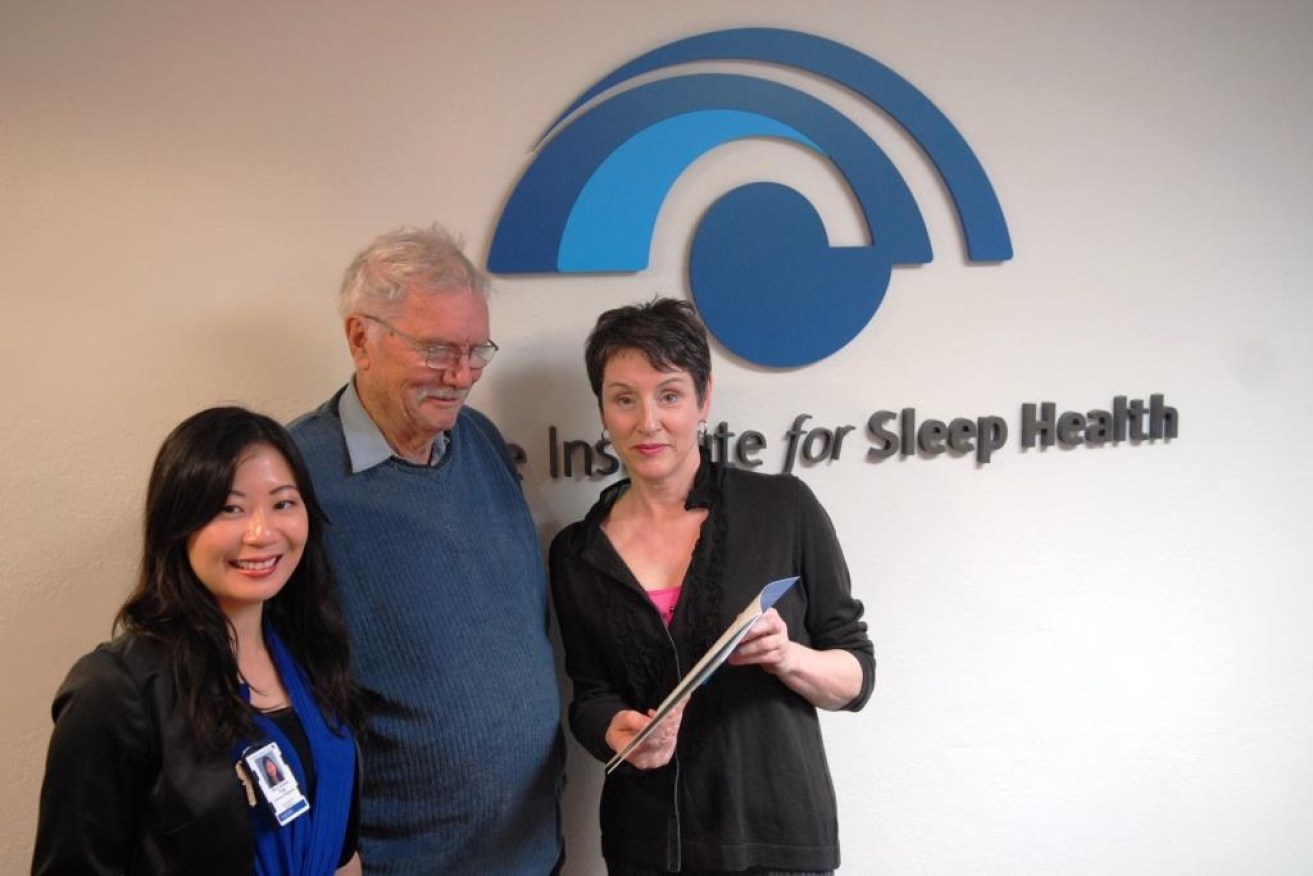
Volunteers needed for sleep apnoea research

Carissa Yap, Advanced Trainee in Respiratory and Sleep from the Southern Adelaide Local Health Network, left, and Dr Harris - from Flinders University's Human Behaviour and Health Research Unit which specialises in managing chronic diseases - consult a potential participant in the new sleep apnoea survey.
Would you volunteer to lose weight to relieve the symptoms of debilitating sleep apnoea?
Overweight adults with confirmed sleep apnoea will soon be invited to sign up for a special research project seeking to show the benefits of losing weight to improve their health and wellbeing – and to get better sleep.
The Adelaide Institute for Sleep Health (AISH) research project will give participants an opportunity to access a successful program developed by the Flinders Human Behaviour and Health Research Unit (FHBHRU) at Flinders University to help patients manage all aspects of their condition.
As well as six months of weight-loss support, incorporating the option to use free high-protein meal replacements, the program is an ideal opportunity for patients to undergo a thorough assessment and adopt a long-term self-management care plan.
Flinders University Postdoctoral Research Fellow, Dr Ching Li Chai-Coetzer, who is the principal investigator from AISH, said the collaboration with Flinders means participants can benefit from the research outcomes while accessing the FHBHRU’s expertise in self-management of chronic diseases, also known as “the Flinders Program”.
“There is now very little doubt that losing excess body weight is an effective way of treating or reducing the severity of obstructive sleep apnoea (OSA) in most people,” said Dr Chai-Coetzer.
“In one study, a 10% weight loss predicted a 26% reduction in the severity of OSA.
“In our experience, a loss of weight of this degree may be enough to reduce the need for the use of therapies such as continuous positive airway pressure (CPAP) in some patients,” she said.
All participants will be offered an exclusive weight-management program, the Impromy program developed by the CSIRO, which have been shown to improve health through weight loss and good nutrition. The great-tasting, high-protein meal replacements are available through selected pharmacies where ongoing support is offered by trained staff.
Along with access to the intensive behavioural support techniques, the project can include advice from dieticians, exercise physiologists and support groups.
Dr Melanie Harris, from Flinders University’s FHBHRU, which is based at the Margaret Tobin Centre, at Flinders Medical Centre, said the unit’s chronic disease management expertise includes self-management of conditions ranging from mental disorders, diabetes and asthma to arthritis, cardiovascular and kidney disease.
The Flinders Program is used by a large number of health professionals in Australia and other countries to enable patients to self-manage their chronic disease.
“Obesity contributes significantly to OSA, which is now recognised as a chronic condition associated with high medical and social costs,” Dr Harris said.
“It is associated with daytime sleepiness and impaired cognitive functioning and can compromise work performance and increase the risk of vehicle accidents.
“It also predisposes to hypertension, stroke, and cardiovascular disease and is associated with diabetes and depression.
Researchers are looking to recruit 40 overweight adults aged between 18 and 70 with a body mass index (BMI) or the standardised calculation of your height and weight of 30 or more who suffer from moderate to severe OSA and who experience at least mild daytime sleepiness.
Participants will be supported by a researcher through the six months, and will be asked to attend three appointments with a Flinders clinician and answer questionnaires to track their sleep, condition management, quality of life, and lifestyle changes over the six months.
The Chronic Condition Self-Management in Obstructive Sleep Apnoea, or “Flinders OSA” study is being funded by a Flinders Medical Centre Foundation grant and supported by the Commonwealth Scientific and Industrial Research Organisation (CSIRO). All Flinders appointments and delivery of the Impromy program will be provided at no cost to participants during their period of involvement in the study.
For more information contact Carissa Yap or Catherine Hansen. Tel: (08) 8275 1187




